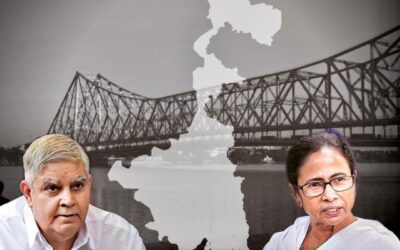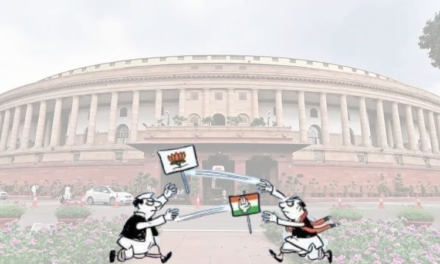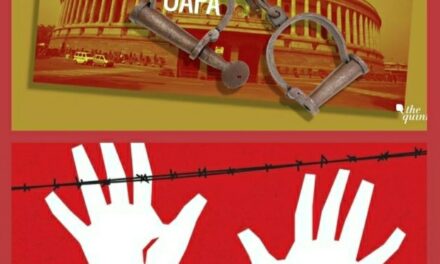Dissent in a political party equals defection?


Madhawi Agarwal
This is part II of two-part series on Anti-Defection Law. First Part can be viewed here.
With the conclusion of elections in several State Legislative Assemblies with a showdown on May 2nd amongst news of widespread dissent and defection, the ‘Aaya Ram Gaya Ram’ law has once again taken center stage. Apart from concerns on its efficacy as an effective barrier against defections, reservations have also augmented that the law seeking a stable government, in reality, has a chilling effect on intra-party dissent with the legislators having to mandatorily align themselves with the view of the party and its leadership for fear that defiance would lead to disqualification.
Defection v. Dissent: Chilling Effect on Intra-Party Democracy?
Mid last year, as the sun rose on the horizon of the “Land of the Kings” on July 12, 2020, the political sphere was rife with speculation that Senior Leader of INC Sachin Pilot, the then Deputy Chief Minister of Rajasthan, claiming support of around 30 of his loyalists MLAs, was going to destabilize the Ashok Gehlot-led INC government in Rajasthan. The Party on its part swiftly issued a whip to all its MLAs to be present in a legislature meeting, or strict action would be taken against them. The rebel MLAs declined to attend. Accordingly, a day later on July 14, the Party removed Pilot from both the posts of Deputy Chief Minister as well as Rajasthan Pradesh Congress Committee Chief, along with two of his loyalists, Vishvendra Singh and Ramesh Meena, from their posts of Cabinet Ministers.
On July 14, Rajasthan Legislative Assembly Chief Whip Mahesh Joshi submitted disqualification petitions against the 19 rebel MLAs including Pilot to the Speaker of the House C.P. Joshi for “voluntarily giving up membership” of the Party under the anti-defection law. Show cause notices were issued to the MLAs. Consequently, Pilot contested the legality of these notices before the Rajasthan High Court challenging the constitutionality of Paragraph 2(1)(a) of the Tenth Schedule on the ground that it violates the basic structure of the Constitution. Emphasizing the distinction between dissent and defection, he argued that an elected representative who merely sought disagreement with policies of the party does not tantamount to acting against the interests of the party or the government. He has a right to free speech and the right of his conscience. The High Court had then ordered a status quo on the show-cause notices.
Even though Pilot has subsequently reconciled and reunited with Ashok Gehlot after meeting with the Gandhis on August 10 with the promise of a three-member committee to resolve his issues, with Gehlot winning the confidence motion on August 14 all members present, the question remains on the efficacy of the anti-defection law. Whether the law intended to act as an effective barrier against political defections has a chilling effect on intra-party discourse where the legislators have to obligatorily align themselves with the view of the party and its leadership irrespective of their own opinions or of that of their electorates.
The Fine Line between Dissent and Defection
The Courts have over the years given a wide scope to the acts which may be construed as defection. In its 1994 judgment of R.S. Naik v. Union of India, Supreme Court observed that the words “voluntarily given up his membership” have wider connotations than “resignation” and this can be inferred from the conduct of a member as well. Similarly in G. Viswanathan v. Hon’ble Speaker, Tamil Nadu Legislative Assembly, Madras, members who had publicly expressed opposition to their party or support for another party were deemed to have resigned. In 2007, in Rajendra Singh Rana v. Swami Prasad Maurya, the Hon’ble Court upheld the disqualification of 13 BSP MLAs holding that the act of giving a letter to the Governor to invite the leader of a rival party to form the government was to be considered an act of voluntarily giving up membership and no further evidence or inquiry was needed.
The ability to be able to engage in free speech and expression is a greatly cherished value in a dynamic democratic body polity. Free speech within a party promotes discourse and debate, allows legitimate disagreements in viewpoints to have a reputable position, and brings transparency in its functioning. Emphasizing the cherished value of free speech in a democracy, the Apex Court in Union of India v. Motion Picture Association has observed that “free exchange of ideas, airing of differing viewpoints, debating and forming one’s views and expressing them, are the basic indicators of a free society”. Further, the Hon’ble Court in In re: Ramlila Maidan Incident, has remarked free speech as the bulwark of a democratic government, indispensable for the proper functioning of the democratic process.
The legislator occupies a high position of trust, he is the accredited representative of his constituency in the Legislature and is its mouthpiece. He represents the hopes and aspirations, needs, and concerns of the people that voted him to power. In the words of statesman and philosopher Edmund Burke, “It ought to be the happiness and glory of a representative to live in the strictest union, the closest correspondence and the most unreserved communication with his constituents. Their wishes ought to have great weight with him; their opinion high respect; their business unremitted attention”. Eminent jurist Nani Palkhivala in his book ‘Our Constitution Defaced and Defiled’ in 1974, denouncing the measures to prevent defection which were under consideration of the Parliament at the time, noted that “No greater insult can be imagined to members of Parliament and the State Legislatures than to tell them that once they become members of a Political Party, apart from any question of the Party constitution and any disciplinary action the Party may choose to take, the Constitution of India itself expects them to have no right to form a judgment and no liberty to think for themselves, but they must become soulless and conscienceless entities who would be driven by their Political Party in whichever direction the Party chooses to push them”.
The existence of the freedom to enter into open and honest discussion in the House without interruption, constraint or corruption is significant for the legislator, who by the very nature of his duties is responsible for the electorates. Without this freedom, the legislator would become a “soulless and conscienceless entity” to be driven like a herd in whichever direction the Party leadership drives him, irrespective of his wisdom or commitment to his constituency, all in the name of Party discipline. A Party may propose a most undemocratic measure, a communal measure and yet he will be obliged to vote for it.
The anti-defection law, while seeking to provide a stable government, also restricts a legislator from voting in line with his conscience and judgment; he is not free to express his independent views for fear that such defiance would lead to his disqualification. The same had been contested by Pilot in his petition that the disqualification notices issued to the dissidents were an attempt to stifle their voices within the Party, and that the provision cannot be so widely construed that the fundamental freedom of speech and expression of a member of a House is jeopardized.
Possible Solutions
The innate loopholes, the partisan role of institutions, and the influence of money in politics have deteriorated the law. The law has come under criticism for the role of the Speaker in being the adjudicating authority for deciding disqualification disputes since it is alleged that the Speaker may act in a partisan manner due to his political loyalties. Therefore it is desirable to replace his role with an independent mechanism. A possible solution can be to refer the disqualification petitions to the President or Governor, as the case may be, to decide based on inquiry to be conducted by the Election Commissioner, as was recommended by the Report of the Committee on Electoral Reforms, better known as the Dinesh Goswami Committee in 1990, the 170th Report of the Law Commission of India on “Reform of Electoral Laws” in 1999 as well as the recent 255th Report of the Law Commission of India on “Electoral Reforms” in 2015. It can even be dealt with by the Ethics Committee of the House of Parliament. Alternatively, an independent Tribunal can be set up headed by a retired Supreme Court Judge or retired Chief Justice of a High Court to ensure speedy and unbiased decisions.
Recently on January 7, Supreme Court admitted a petition by INC leader Jaya Thakur seeking directions to debar disqualified members from re-contesting the by-elections during the term of the House to which they were elected. The petition, highlighting the incidents of defection in Karnataka and Madhya Pradesh, claimed that the MLAs who resign are given ministerial posts by the new government along with tickets to re-contest for by-elections rendering the provisions of the Tenth Schedule redundant and otiose. The Report of the National Commission to Review the Working of the Constitution of 2002 had likewise recommended that defectors should be barred from holding any public office or any remunerative political post for the remaining term or until the next fresh elections whichever is earlier. Thus, to prevent the foul of mass resignations with intention of toppling the government under a quid-pro-quo deal, the members who have resigned should be forbidden to contest the by-election that follows their resignation, only being allowed to contest after the term of the Assembly ends.
Mere expression of dissatisfaction or even disillusionment against the Party leadership must not be treated as defection. There is a need to give elected legislators more independence to stand up for their constituencies. Manish Tewari of INC in 2010 had moved a Private Member Bill in Lok Sabha, having elapsed since, proposing a Constitutional Amendment that limited grounds of possible disqualification in case of member voting contrary to Party direction or whip, to only with regard to a confidence motion, no-confidence motion, adjournment motion, money bill or financial matter. The amendments proposed were along the same lines as the recommendations of the Dinesh Goswami Committee of 1990, which had suggested that disqualification provisions should be made specifically limited to vote of confidence or no-confidence motion or money bill. Whereas the 170th Law Commission Report of 1999 had recommended that whip should be issued only when the voting in the House affects the continuance of the government and not on each and every occasion. Thus, the law could be amended to disqualify members only if they vote against the Party whip during events that determine the stability of the government such as no-confidence motions or financial budgets.
Madhawi Agarwal is a Delhi-based advocate. (The opinions expressed in this publication are those of the author/s. They do not purport to reflect the opinions or views of The Policy Observer or our members.)
Related Articles
Privatization of Liquor: A Look Into the Loopholes of The Policy
The division of the city was done into 32 zones and licenses were based on the same. In June 2021, the tenders were issued for the application of L-7Z and L-7V licenses. The office of commission of the excise government of the national capital issued terms and conditions for the grant of licenses.
The Information Technology Rules, 2021- A Constitutional Scrutiny
A law prescribing the procedure for depriving a person of his ‘personal liberty has to meet the requirements of Article 19 and if not shall be struck down as arbitrary under Article 14. Liberties and restrictions should run parallel to each other. One overpowering the other would distort the fair working of the constitutional machinery.
Gubernatorial impropriety
The office of the Governor is slowly and steadily being converted into an extended political branch of the central government. The scale and scope this time around are more than ever before! Are we ready for the implications this will have on National Unity and the dent it will cause to the constitutional principles of Cooperative Federalism, Constitutional Morality, and Democracy?









